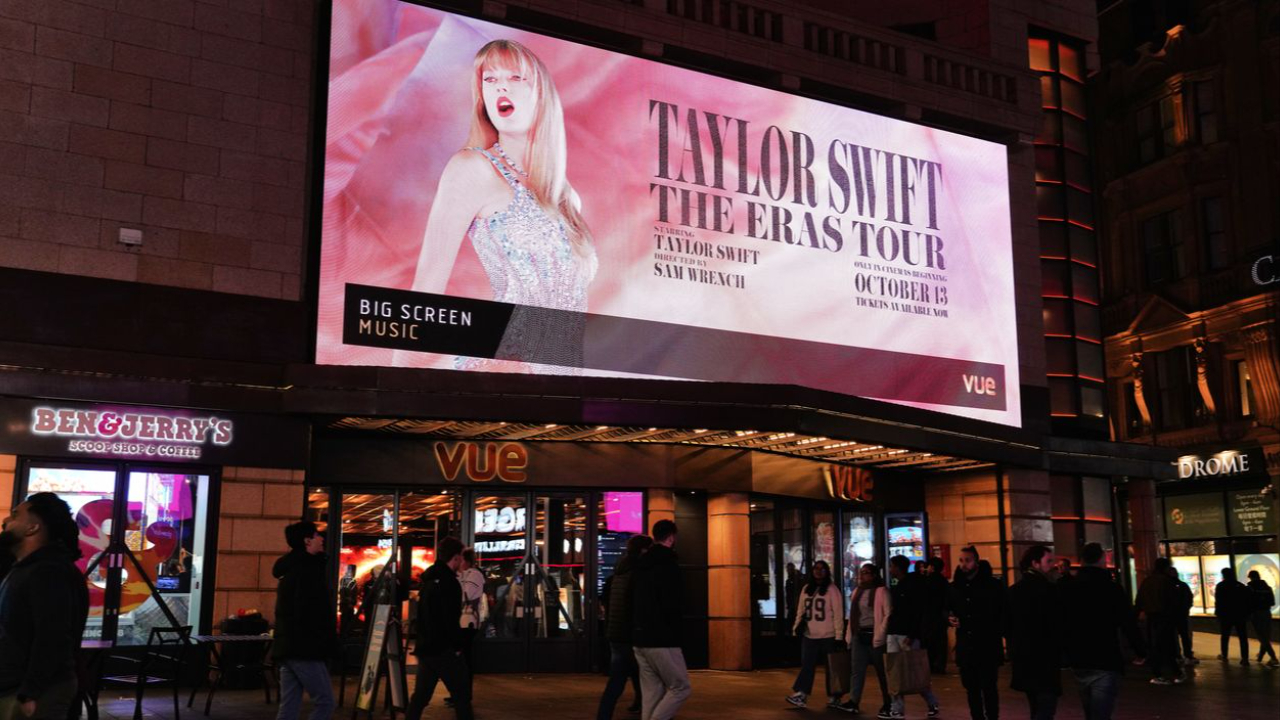There's nothing more predictable than a Taylor Swift backlash
Oct 14, 2025
There's nothing more predictable than a Taylor Swift backlash. And since the release of The Life of a Showgirl, the attacks have come fast and furious. She’s been accused of:
- Playing it too safe artistically — some critics say she’s become too comfortable, too commercially strategic, too unwilling to reinvent herself (as if her albums haven’t moved effortlessly between country, synth-pop, indie folk, alt-rock, and cinematic balladry).
- Flirting with far-right agendas — according to some critics, expressing a desire for marriage and children now signals 'tradwife' territory. Because heaven forbid a woman might want both a career and a family, or want to celebrate personal happiness after a string of very public breakups — all while building a billion-dollar creative empire.
I say this, noting that, yes, singing about 'the whole street looking like you' is problematic in a moment when immigrants and people of colour are living in real fear under the Trump administration. And yes, there’s a kind of unawareness that comes with privilege — including white privilege — that only real exposure and reflection can shift. I also note that Swift has a strong history of leaving 'easter eggs' for her audience, and it's not a huge stretch to associate 'easter eggs' with 'dogwhistling'. But, this is also the woman who shared this post and this post with her 281 million followers, and toured with an incredibly diverse cast during the Era's tour. Are we suddenly supposed to believe she is a secret member of the alt-right? Recognising the difference between an insensitive lyric and an ideological alignment requires the merest application of critical thinking. The leap from imperfect language to far-right sympathiser says as much about our collective anxiety as it does about her songwriting. - Being racist — the critique I saw suggests that singing about her relationship is an act of centring whiteness, as oppoesd to writing from her lived experience.* Here’s the thing that bothers me most about this critique: if the left keeps labelling allies and potential allies as enemies because they haven't spent their entire lives centring anyone but themselves and therefore, have failed to meet some impossible standard of perfect allyship, then guess what happens? Those people don’t become more progressive - they retreat. They tune out. Or worse, they get pulled into the arms of the right, where they’re welcomed not because they share the ideology, but because someone finally stopped shaming them.
- Not being sufficiently literary to call herself an English teacher - apparently evidenced by the fact that she doesn't have a book club... Sigh.
The spurious nature of some of these critiques doesn't mean that people shouldn’t engage critically with her art - they should - but that much of the commentary isn’t really about the music. It’s about discomfort with a woman who’s both visible and self-directed, who refuses to play the role others have scripted for her.
There’s a pattern here that’s hard to ignore: once a woman becomes too visible, too successful, too certain, the knives come out.
Visible women are easy targets. Their presence in the public domain invites commentary on their personhood, their creative choices, and even on the way they express their love. It’s a commentary people feel licensed to make, in a way they rarely do with men.
The minute a woman’s success begins to look too big, too confident, too profitable, the cultural tide turns. Admiration morphs into irritation. The same qualities that were once framed as ambitious or empowering are reinterpreted as manipulative, calculating, or insincere.
This is an old story dressed in new clothes. From Cleopatra to Madonna, women who rise high enough to be seen are rarely allowed to stay there without punishment. We talk about equality, but our social reflexes still haven’t caught up. The patriarchal imagination struggles to hold space for powerful women - it either sexualises them, trivialises them, or tears them down.
The cycle of rise and ruin
It starts innocently enough: praise for talent, admiration for perseverance, applause for relatability. Then comes the turning point - the moment when admiration shades into discomfort. The woman becomes too visible, too wealthy, too influential. She begins to take up space reserved for men, and suddenly the knives come out.
The language of critique becomes gendered. A man with vision is a genius; a woman with control over her career is a ‘master manipulator’. A man monetising his art is savvy; a woman doing the same is ‘cynical’. Taylor Swift isn’t the first to live through this, but she’s one of the most documented examples of the pattern.
And the backlash intensifies when she becomes - shock horror - happy. Because the world doesn’t quite know what to do with a woman who has everything she once said she wanted. We’re comfortable with her suffering, hustling, proving herself. But joy? Fulfilment? Success without apology? That seems to unsettle people more than anything else.
The threat of the visible woman
Visibility has always been dangerous territory for women. To be visible is to be subject to judgment. To be successful is to magnify that gaze. Swift’s public life - like those of Meghan Markle, Greta Gerwig, and Beyoncé - reminds us how fraught the terrain remains. (Noting that scrutiny is not distributed evenly. For women of colour like Markle and Beyoncé, the gaze is experienced differently — expressed as it is at the intersection of sexist and racist assumptions and critique.)
The public feels ownership over visible women: their art, their body, their choices, their love lives. And when she asserts boundaries, she’s accused of being controlling. When she reveals vulnerability, she’s manipulative. When she’s political, she’s opportunistic. Every move is a double bind.
Every visible woman becomes a mirror
Every visible woman becomes a mirror. She reflects back what others project. People see in her what they want to see, what they fear to see in themselves, or what they won't allow for themselves. Their viewpoint is always filtered through their own experiences, prejudices, and agendas.
So much so that I sometimes wonder if any of us really sees - particularly in parasocial relationships - or if we’re all just projecting. Each of us, casting our own stories onto whoever’s brave enough to stand in the light.
And this, friends, reveals the heart of our collective fear of visibility: the loss of control over how we’re perceived. To be visible is to be misunderstood, to be turned into a symbol, a target, or an idea. It’s to relinquish the fantasy of being universally liked and be willing to become an easy target for everyone else's grievances.
Why women policing women hurts us all
Perhaps what makes the pattern even more painful is how many women join in. Internalised patriarchy is a powerful force. We’ve all been taught to measure our worth against other women - to feel that another woman’s success somehow diminishes our own.
So when someone like Swift reaches stratospheric fame, it can stir something old and uncomfortable. Envy. Comparison. The belief that there’s only so much room at the top, and she’s taking up too much of it.
That scarcity mindset doesn’t just breed competition—it breeds expectation. Everyone wants something from her.
The right wants to drag her down. They’re terrified of her power—of her independence, her refusal to stay small, her non-compliance with their ideal of womanhood: accommodating, domestic, self-sacrificing.
And the left wants to perfect her. They want her to be the ideal liberal activist, the pop-culture conscience, flawlessly attuned to every social issue, using her career to advance their causes. Which is just another way of controlling her narrative - another demand that she serve a script written by someone else.
But every time we join the chorus of criticism rather than curiosity, we reinforce the very system that limits us all.
What this reveals about us
Ultimately, the backlash against successful women is not really about them - it’s about us. It reveals our unresolved relationship with female power. We’re still learning how to celebrate it without suspicion, how to let women be large and complex without demanding humility as payment for success.
Until that shifts, the cycle will keep repeating. Swift will be followed by the next woman who shines too brightly, and the pattern will begin again.
Breaking the pattern
To break it, we all need to catch ourselves in the act - each time we’re tempted to downplay, diminish, or deride another woman’s success.
We can ask: What in me feels threatened by her confidence? What story about women’s ambition have I unconsciously absorbed?
When we begin to see those stories for what they are - old scripts written for a smaller version of womanhood - we can rewrite them. We can learn to celebrate women who take up space, rather than punishing them for daring to do so.
Every visible woman is both mirror and teacher.** Taylor Swift’s success doesn’t just provoke envy; it provokes reckoning. She shows us what it looks like when a woman insists on owning her narrative, when she refuses to make herself smaller for our comfort.
And she forces us to ask the harder question: When a woman shines, do we see her - or do we only see ourselves reflected back?
PS. What I appreciate most about Taylor Swift is her persistence. Despite the criticism, she keeps her focus on where she's headed.
- Since the release of The Life of a Showgirl she’s broken the modern-era single-week equivalent album unit record, selling over 4 million units in its first week.
- The album placed all 12 tracks in the top 12 of the Billboard Hot 100 — the first album ever to do that.
- She sold 1.2 million vinyl copies in a single day — breaking the all-time vinyl sales record.
- She’s now a 15-time No. 1 album artist.
*I recently read a really constructive critique of race and representation by K.A. Ren Wyld on the novel The Echoes, which stands in stark contrast to some of the oversimplified, 'gotcha' labels levelled at The Life of a Showgirl. Ren Wyld’s piece offers a careful account of gaze, power, race, and craft, as well as what ethical practice requires from non-Indigenous writers. I recommend it to all non-Indigenous writers and readers.
** Since writing this piece, I watched this interview. If you want an account of what Swift herself was thinking about when she penned the songs on The Life of a Showgirl, do watch. At about 10:30 mins through the interview, she notes that as entertainers, 'one of our main jobs, I think, is to be a mirror for people. You look into the art we make, you see yourself back. The way you feel about our art has a lot to do with the life experience that you're having at this point in time, and that's why I'm so happy I have so many different albums.' As consumers of art, I think this is so important to remember.




